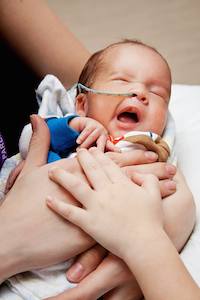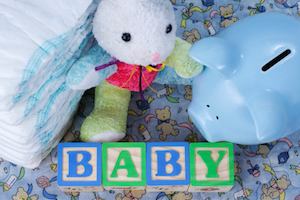As a NICU parent, the day your baby comes home from the NICU is the day you’ve been dreaming of. And yet, the truth is that it’s often an overwhelming and scary day. After days or weeks or months of having professional caregivers all day and night, endless supplies of baby necessities, laundry done by the hospital, treatments done by therapists, and so much more, going home and doing it all on your own can be a huge shock. Parents often feel overwhelmed, unsupported, and surprised at how different and difficult it can be to care for this baby they know so well but haven’t cared for independently.
While you are still in the NICU, waiting for that wonderful day, there are some great ways to prepare ahead of time to make the most of going home. I like to break them down into 4 main categories, making it easier for parents to remember. These tips can also be found on a ready-to-print checklist right on my website!
1. Practice as much as you can while you’re still at the hospital:
A great way to make the most of the painfully slow time – waiting for discharge – is to learn as much as possible from the nurses and other staff. When you know that discharge is coming up soon, get as pro-active as possible about participating in your baby’s cares! If you are able, be at the NICU more than before, so that you can learn what your baby needs and what your baby does throughout the day. Room in if your hospital allows it. And if you can’t be there any more, do as much as you can during the time you’re there:
- Diaper changes
- Taking baby’s temperature
- Giving baby a bath
- Preparing formula or adding extra calories to breast milk
- Giving medications (will you need extra syringes, or special measuring spoons?)
- Tummy time with baby (when will be the right time for this?)
- Swaddling
- Using any equipment you’ll use at home (oxygen, monitors, pumps, reflux wedges, etc)
- Infant massage
- Practice infant CPR (if your hospital offers it)
2. Ask Questions:
Parents say time and again that they wish they had asked more questions when they had the chance. NICU staff are used to parents asking millions of questions and should be happy to help you feel prepared. Here are some examples of great questions to ask – you may already know these answers, but sometimes parents don’t know and don’t think to ask them:
- How often should I bathe my baby?
- Does my baby need Synagis?
- When do I need to call my doctor?
- Is my baby sleeping on his back all the time now? (If not, find out why. Ask your hospital to start getting baby used to it if they aren’t already)
- Will my baby have any follow-up appointments? Do I need to make them or will the hospital make them for me?
- Where do I get help with breastfeeding if I need it after we are discharged?
- Can I take my baby out of the house at all? How do I handle visitors coming to my home to visit my new NICU graduate?
- Where do I buy the formula my baby needs?
- How often does my baby: Eat? Poop? Cry? Sit in a swing?
- Are there support groups for NICU families after we go home?
- Where can I get my carseat checked for proper installation?
- There are many, many more – be sure to ask everything you think of!
Every person you ask will have a different answer, so ask more than one. There’s no one right answer, and you can learn a lot by asking many people for their thoughts and ideas.
I highly recommend one last question, even though it can be awkward to talk about – Ask about where someone gets help if they need it for PTSD or Post-Partum Depression. These topics are rarely talked about, but they affect a tremendous number of new parents and NICU parents. By asking, you’ll know who to call locally if you find yourself or another former NICU parent in need of support.
3. Prepare at home:
A few simple things at home can make your first few days and weeks at home a little easier:
- Clean the house (this makes a WONDERFUL gift – if anyone out there wants to do something thoughtful – offer to clean, or hire someone to clean the baby’s home just before discharge)
- Stock the fridge with healthy, easy foods, as well as some good ol’ comfort foods.
- PRACTICE USING YOUR CARSEAT! It’s incredibly frustrating to have parents show up to take their baby home, only to find they have no idea how to use the carseat. I don’t mean getting it in and out of the car, most people know how to do that. I mean knowing how to adjust the straps – loosen, tighten, change settings for smaller or larger babies and how to use the clips. Please, read the manual ahead of time, and use a stuffed animal or blanket roll to practice with.
- Buy things you’ll need:
- The obvious – diapers, wipes, spare pacifiers, outfits, blankets, burp cloths, etc…
- Hand sanitizer
- Masks (for any visitors with any sniffles or possible exposure to colds)
- Formula (if your baby is using it)
- Any prescription medications your baby needs
- A swing if your baby is used to one at the NICU
- A supply of sleep sacks, if that’s what the NICU is using because that’s what your baby is used to
4. Gather memories:
Another thing parents often regret is they didn’t take the time to gather a few important keepsakes to remember their time in the NICU. While most parents CAN’T WAIT to get home, later in life they feel quite an attachment to the caregivers who cared for their baby, and want nice ways to remember them. Now is the time to do these things so you’re not scrambling on the hectic day of discharge:
- Ask to keep some of the items your baby may outgrow during your stay – the disposable blood pressure cuff, or a name band, for example.
- Be sure to ask your favorite nurses and staff for a picture as you get closer to going home – they may not be at work the day you go and you may be sad to have no pictures with your baby’s first extended family.
- Consider having the nurses all sign their names to a card or photo of your baby – it’s a cute way to remember everyone who cared for your little one.
Good luck with your first days home. Don’t be afraid to ask for help, and certainly accept help when it is offered. There are many more ways to prepare for your baby’s discharge from the NICU – what else would you recommend?
Guest Blogger
 Trish Ringley, RN, is a mother of two and has been a NICU nurse since 1997, practicing in Alaska, Colorado and California. She is a passionate NICU-parent advocate and has recently become active in the online world of NICU parent support. Initially she began blogging about the NICU from a nurse’s perspective at NICU Central, and more recently she created a beautiful online store that is devoted exclusively to serving the needs of NICU families, called EVERYtinyTHING. When she’s not at work at the NICU, you can find her on Facebook, blogging at NICU Central, or most of the time spreading a little joy through her store.
Trish Ringley, RN, is a mother of two and has been a NICU nurse since 1997, practicing in Alaska, Colorado and California. She is a passionate NICU-parent advocate and has recently become active in the online world of NICU parent support. Initially she began blogging about the NICU from a nurse’s perspective at NICU Central, and more recently she created a beautiful online store that is devoted exclusively to serving the needs of NICU families, called EVERYtinyTHING. When she’s not at work at the NICU, you can find her on Facebook, blogging at NICU Central, or most of the time spreading a little joy through her store.




